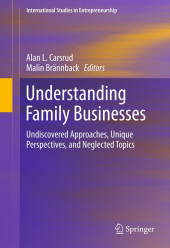 Neuerscheinungen 2013Stand: 2020-01-07 |
Schnellsuche
ISBN/Stichwort/Autor
|
Herderstraße 10
10625 Berlin
Tel.: 030 315 714 16
Fax 030 315 714 14
info@buchspektrum.de |

Malin Brännback, Alan L. Carsrud
(Beteiligte)
Understanding Family Businesses
Undiscovered Approaches, Unique Perspectives, and Neglected Topics
Herausgegeben von Carsrud, Alan L.; Brännback, Malin
2012. 2013. xii, 328 S. 18 SW-Abb.,. 235 mm
Verlag/Jahr: SPRINGER, BERLIN; SPRINGER NEW YORK 2013
ISBN: 1-461-42966-8 (1461429668)
Neue ISBN: 978-1-461-42966-1 (9781461429661)
Preis und Lieferzeit: Bitte klicken
Family businesses range in scale from roadside snack stalls to multinational conglomerates. Featuring a multidisciplinary approach that includes numerous case studies, this volume offers provocative new insights and outlines an agenda for future research.
Businesses owned and operated by families constitute the vast majority of firms around the world. These firms are found in all industrial segments, from retail and service establishments to heavy manufacturers. Their sizes and revenues range from the smallest venture of a husband and wife roadside food stall in rural India to the largest multinational, highly diversified corporations in the United States and Europe. Many challenges, such as competition, regulation, environmental concerns, access to capital, and macroeconomic factors confront family and nonfamily firms alike. In addition, family and closely-held firms grapple with such issues of succession, continuity, conflict resolution, identity and organizational roles, estate and financial planning that are idiosyncratic to them; when psychological, social, and emotional factors are in play, constantly changing familial relationships influence the strategic and financial choices they make. Yet, there has been comparatively little theoretical or empirical research undertaken on family firms, relative to entrepreneurship and strategic management.
This book addresses gaps in the literature by presenting a holistic, multi-disciplinary approach to the study and practice of family business that draws from such fields as psychology, anthropology, sociology, strategy, family therapy, family studies, wealth management, and international business. An international array of experts addresses both macro issues (including the role of family businesses in new business creation and economic development, influences of culture on family business, public policies that can encourage or threaten family business) and firm management (strategic and financial decision making, governance, entering and exiting). Featuring case studies from firms in a variety of industries, Understanding Family Businesses not only offers provocative new insights on family business dynamics, but outlines an agenda for future research.
Chapter 1 Where Have We Been and Where We Should Be Going in Family Business Research.- Chapter 2 Family Business: A Global Perspective from the Panel Study of Entrepreneurial Dynamics and the Global Entrepreneurship Monitor.- Chapter 3 Intentions in the Family Business: The Role of Family Norms.- Chapter 4 Identity Dynamics in the Family Business Context: A Novel(´s) Perspective
Björn Kjellander, Mattias Nordqvist and Friederike Welter.- Chapter 5 Love, Hate and Desire: The Role of Emotional Messiness in the Business Family.- Chapter 6 What´s Love Got to Do With It? Marriage and Divorce in Family Business.- Chapter 7 The Bad Seed´s Poisonous Harvest: How Offspring Sow and Reap Deviant and Dysfunctional Behavior in the Family Business.- Chapter 8 Double Roles, Double Binds? Double Bind Theory and Family Business Research.- Chapter 9 Power and Learning in the Dynamics of Family Business Development.- Chapter 10 How to Create Trust in Family Firms and Rebuild It When It´s Lost: Implications for Practice and Research.- Chapter 11 Entrepreneurial Leadership and the Family Business.- Chapter 12 Do Family Councils Really Work? The Need for Empirical Study.- Chapter 13 Transferring Strategy Research to the Family Firm Context: A Fit Perspective on Performance in Family Firms.- Chapter 14 Follow the Capital: Benefits of Tracking Family Capital across Family and Business Systems.- Chapter 15 Understanding Hybrid Identity Organizations: The Case of Publicly Listed Family Businesses.- Chapter 16 New Theoretical Perspectives on Family Business Entrepreneurial Behavior.- Chapter 17 Sustaining Family Wealth: The Impact of the Family Office on the Family Enterprise.


